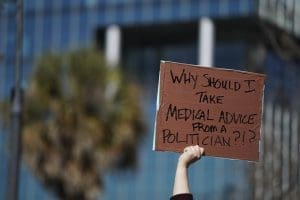New bill could stop discrimination against low-income people who need abortions
Prohibitive costs are blocking people from getting health care, but House Democrats want to change that.

A new study shows that Medicaid coverage is crucial for ensuring access to abortion — and a bill recently introduced in Congress could help make that happen.
Advancing New Standards in Reproductive Health, a project of the University of California, San Francisco, recruited people from all 50 states who had used Google to search for abortion care.
What the study learned was that in the ensuing four weeks, 48% of people had obtained an abortion, 20% had decided to continue their pregnancies, and 32% were still trying to obtain an abortion a month later.
People who live in states where Medicaid funds cannot be used for abortion services, the study found, had “significantly higher odds” of still seeking to obtain an abortion at the four-week follow-up.
This inability to access care is in part because of the Hyde Amendment. Hyde was first passed by Congress in 1977 and prohibits Medicaid funding from going to abortions. With that, the vast majority of states — 34 states and the District of Columbia — bar the use of Medicaid funds except in certain rare cases. The remainder of states circumvents this restriction by using state funds.
For low-income people in those 34 states, the cost of an abortion can be what the ANSIRH study calls a “catastrophic health expenditure.” An earlier study found that for nearly half of abortion patients, the out-of-pocket costs for the abortion are over one-third of their monthly income and additional earlier studies found that a lack of state Medicaid coverage made it impossible for some low-income people — as many as 1 in 4 — to get abortions.
This state of affairs disproportionately affects women of color, as they are more likely to be poor and therefore more likely than white women to receive health insurance through Medicaid. All Above All, a group that centers people of color in the fight for abortion rights, called the Hyde Amendment an “often insurmountable barrier” to obtaining an abortion.
There’s a possibility that barrier could be lifted.
On March 25, several legislators introduced the EACH Act, which would repeal Hyde and guarantee abortion coverage for all people, regardless of what they earn or where they live. That doesn’t just include restoring Medicaid coverage, although that is a huge part of the bill.
Currently, anyone who receives their health care through a federal government provider, like the Veterans Administration or the Indian Health Service, cannot have an abortion covered by their insurance. People in the Peace Corps, people in prison, federal employees and dependents, members of the military — all of these individuals suffer under funding bans that compromise their ability to obtain an abortion.
The EACH Act would undo this thicket of funding restrictions.
This isn’t the first time EACH has been introduced. In fact, Vice President Kamala Harris was a co-sponsor of the bill when it was introduced in 2019 for the first time. This time, though, there is historic support for ending Hyde, including from the president. Joe Biden has been very vocal about his opposition to Hyde.
The combination of public support, a legislative push, and an administration willing to stand for the principle that all people should be able to access abortion care could finally spell the end of Hyde.
Recommended

Ohio doctors fear effects of emergency abortion care case set to go before U.S. Supreme Court
A federal law that allows emergency departments to treat patients without regard to their ability to pay will be under U.S. Supreme Court scrutiny this week, and Ohio doctors are concerned about the case’s local impact on emergency abortion care.
By Susan Tebben, Ohio Capital Journal - April 23, 2024
House GOP votes to end flu, whooping cough vaccine rules for foster and adoptive families
A bill to eliminate flu and whooping cough vaccine requirements for adoptive and foster families caring for babies and medically fragile kids is heading to the governor’s desk.
By Anita Wadhwani, Tennessee Lookout - March 26, 2024
U.S. House Speaker Johnson says IVF should be protected — just not by Congress
U.S. House Speaker Mike Johnson said Thursday that it’s up to states and not Congress to preserve access to in vitro fertilization, weighing in on a growing national debate and campaign issue.
By Jennifer Shutt, States Newsroom - March 14, 2024








































































